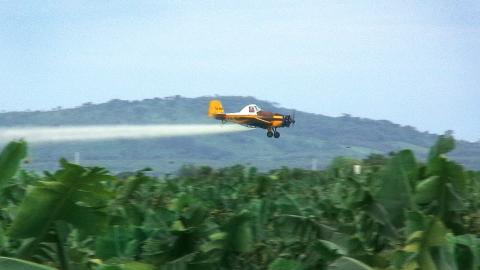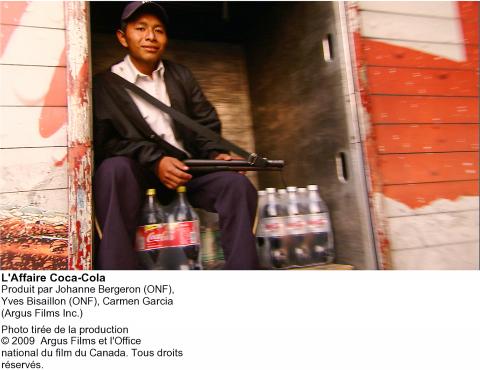Bananas, Coca-Cola and gold. The three commodities have one thing in common: a dark side, which is being exposed and examined by the four documentary films selected for the Fair Trade Film Festival (公平貿易影展). Celebrating its third edition this year, the festival is a two-month-long touring event that begins tomorrow and will travel to more than a dozen cafes, health shops, educational centers as well as arts and cultural spaces across the country.
The festival is organized by the Taiwan Fairtrade Association (台灣公平貿易協會) with an aim to build communication and generate discussions about inequities and injustice resulting from the global production and trading systems. Established in 2010 as the first organization promoting fair trade in Taiwan, the association sets its primary goal as educating the general public about the principles and practices of fair trade as a social movement that helps producers in poor countries improve their difficult, often hazardous conditions and achieve wider sustainability.
“To fair trade activists, buying organic products is not so much about living healthily as safeguarding human rights,” says Karen Yu (余宛如), who serves as a council member of the association.

Photo Courtesy of Fair Trade Taiwan
The violation of human rights is illustrated in Swedish director Fredrik Gertten’s 2009 Bananas, which tells the story of 12 banana plantation workers in Nicaragua who are suing Dole Food Company, one of the world’s biggest fruit and vegetable corporations, for knowingly exposing them to dibromochloropropane (DBCP), a pesticide known to cause sterility. Banned in the US in the 1970s, the pesticide continued to be used by Dole in Nicaragua until the 1980s.
The film was selected to compete at the 2009 Los Angeles Film Festival, but the festival organizers later removed it after Dole took action to stop the film from gaining viewership. And exactly how far the American multi-national has gone to use its corporate power to suppress independent film and its makers subsequently becomes the story in Gertten’s Big Boys Gone Bananas!.
Meanwhile, dark secrets behind the Coca-Cola empire are revealed in The Coca-Cola Case, which follows two American lawyers and one activist as they wage a legal and human rights battle against the US beverage giant, attempting to hold it accountable for abduction, torture and murder of union leaders trying to improve working conditions in Colombia, Guatemala and Turkey.

Photo Courtesy of Fair Trade Taiwan
Moving to gold mines. The Business of Gold in Guatemala examines conflicts and harm inflicted on communities and the environment resulting from mine exploration in Central America, where the governments give out mining concessions to international mining companies. The plot focuses on the collective resistance by Mayan indigenous groups in Guatemala against Canadian transnational company Goldcorp.
For Yu, film is an effective way to further understanding and bring about changes. “We want to tell the public that there are lots of problems and controversies surrounding the way our food is grown, processed and distributed. Through the films, we want to start dialogue on how we can make a better choice,” she says.
The touring festival will open tomorrow at Apoozi (阿布籽香草工坊) in Tamsui District (淡水區), New Taipei City, and travel across the country to hold screenings in Hsinchu County, Greater Taichung, Greater Kaohsiung, Hualien County and Taitung County until July 28. All participating shops, businesses and organizations share the same values and ideas about fair trade, and screenings are free. More information about the schedules and locations can be found at www.okogreen.com.tw/blog/?p=2669.

Mongolian influencer Anudari Daarya looks effortlessly glamorous and carefree in her social media posts — but the classically trained pianist’s road to acceptance as a transgender artist has been anything but easy. She is one of a growing number of Mongolian LGBTQ youth challenging stereotypes and fighting for acceptance through media representation in the socially conservative country. LGBTQ Mongolians often hide their identities from their employers and colleagues for fear of discrimination, with a survey by the non-profit LGBT Centre Mongolia showing that only 20 percent of people felt comfortable coming out at work. Daarya, 25, said she has faced discrimination since she

April 21 to April 27 Hsieh Er’s (謝娥) political fortunes were rising fast after she got out of jail and joined the Chinese Nationalist Party (KMT) in December 1945. Not only did she hold key positions in various committees, she was elected the only woman on the Taipei City Council and headed to Nanjing in 1946 as the sole Taiwanese female representative to the National Constituent Assembly. With the support of first lady Soong May-ling (宋美齡), she started the Taipei Women’s Association and Taiwan Provincial Women’s Association, where she

More than 75 years after the publication of Nineteen Eighty-Four, the Orwellian phrase “Big Brother is watching you” has become so familiar to most of the Taiwanese public that even those who haven’t read the novel recognize it. That phrase has now been given a new look by amateur translator Tsiu Ing-sing (周盈成), who recently completed the first full Taiwanese translation of George Orwell’s dystopian classic. Tsiu — who completed the nearly 160,000-word project in his spare time over four years — said his goal was to “prove it possible” that foreign literature could be rendered in Taiwanese. The translation is part of

It is one of the more remarkable facts of Taiwan history that it was never occupied or claimed by any of the numerous kingdoms of southern China — Han or otherwise — that lay just across the water from it. None of their brilliant ministers ever discovered that Taiwan was a “core interest” of the state whose annexation was “inevitable.” As Paul Kua notes in an excellent monograph laying out how the Portuguese gave Taiwan the name “Formosa,” the first Europeans to express an interest in occupying Taiwan were the Spanish. Tonio Andrade in his seminal work, How Taiwan Became Chinese,